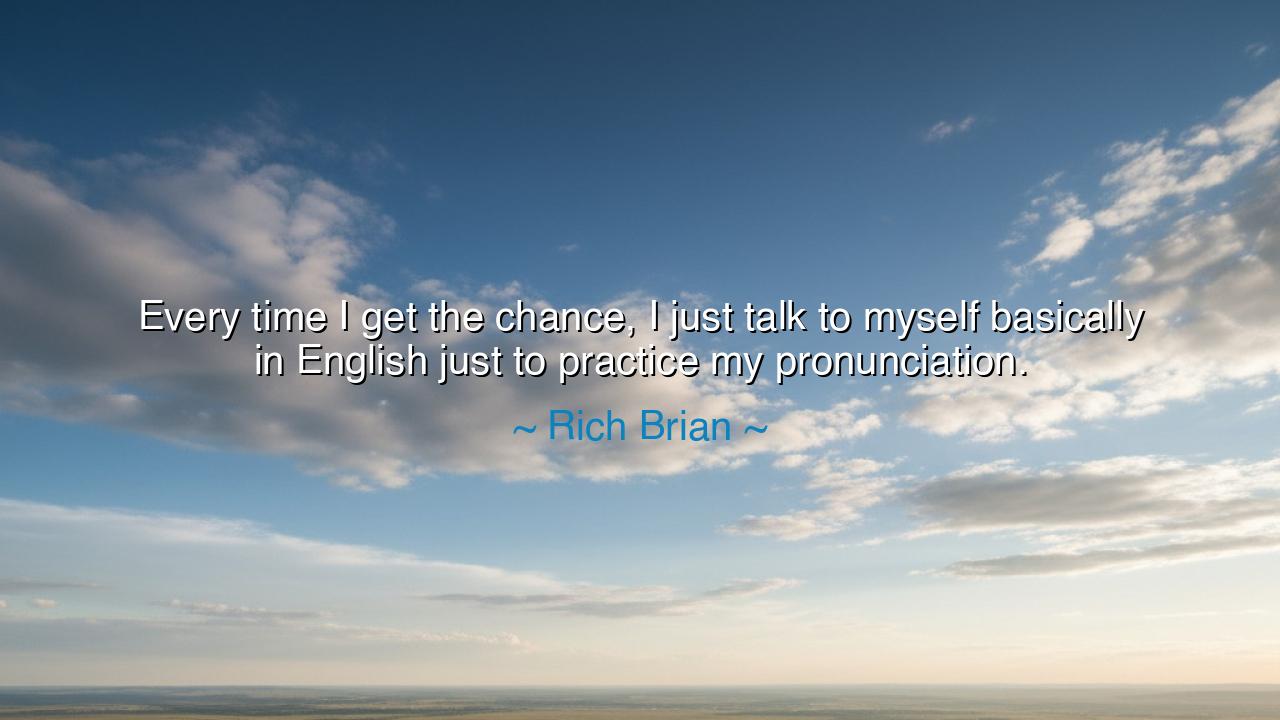
Every time I get the chance, I just talk to myself basically in
Every time I get the chance, I just talk to myself basically in English just to practice my pronunciation.






"Every time I get the chance, I just talk to myself basically in English just to practice my pronunciation." These words, spoken by Rich Brian, reveal a profound dedication to self-improvement and the pursuit of mastery in language. What Brian expresses is not just the act of practicing a skill, but the commitment to continuous growth—the humble recognition that excellence is not born overnight, but cultivated through repetition, dedication, and self-reflection. To talk to oneself in a language not native to one’s soul is to engage in an ongoing conversation with one’s potential, to embrace the struggle of growth and the discomfort that comes with it, knowing that it is the only path to mastery.
This idea of practicing in solitude, of speaking to oneself to achieve greatness, recalls the ancient wisdom of Socrates, who famously stated that "the unexamined life is not worth living." For Socrates, introspection and self-dialogue were the most profound paths to wisdom and self-awareness. His life was a continuous journey of questioning, of asking himself the hard questions and seeking improvement in every aspect of his being. In the same way, Brian’s practice of speaking to himself in English is a form of inner dialogue—a conscious effort to refine his skills and abilities, to challenge his limits, and to become a better version of himself.
Consider the story of Leonardo da Vinci, a man whose thirst for knowledge was insatiable. While others focused on one discipline, da Vinci explored the realms of art, science, engineering, and anatomy with equal fervor. His notebooks are filled with reflections and sketches, many of which reveal his constant practice and self-correction. Da Vinci did not wait for external recognition; he practiced, experimented, and honed his craft in solitude, driven by the desire for perfection. Like Brian, who practices his pronunciation in moments of quiet, da Vinci’s success came from a lifetime of self-guided improvement.
This devotion to practice is not limited to great historical figures. Consider the life of the great Miyamoto Musashi, the legendary Japanese swordsman. Musashi did not simply rely on his natural talent; he trained for years, refining his technique through repetition and reflection. He often practiced his swordsmanship alone, analyzing each movement and correcting his form in the stillness of his mind. Like Brian, who speaks to himself in English, Musashi understood that true mastery requires more than external instruction—it requires a personal commitment to constant growth and the courage to face one’s own shortcomings.
Brian’s approach to learning English reflects this personal discipline—the belief that improvement is not about waiting for opportunities but about creating them through deliberate action. The act of speaking to oneself, though seemingly simple, is a powerful exercise in accountability. It forces the individual to face their own voice, to listen carefully, and to make adjustments. This practice mirrors the ancient approach to craftsmanship, where the work itself is the teacher, and the act of repetition is the path to refinement.
The lesson in Brian’s words is clear: mastery in any field, whether language, art, or sport, comes not from waiting for the right circumstances or the perfect moment, but from the quiet discipline of consistent practice. In a world that values instant success, it is easy to forget that greatness is born in the shadows of our daily efforts—in the times when no one is watching, when the work feels small or insignificant. Yet it is in these moments of self-reflection and dedication that true progress is made. Just as Brian practices his English pronunciation in solitude, so must we all embrace the quiet, uncelebrated acts of practice that lead to our own personal mastery.
Thus, let us take Rich Brian’s words to heart and cultivate the discipline of practicing our craft, no matter how small the steps may seem. Whether in language, art, or any other pursuit, the journey toward mastery is a path that must be walked with patience, self-awareness, and a willingness to improve every day. By speaking to ourselves, by asking ourselves the hard questions and challenging our own abilities, we carve out the space for growth and self-mastery. The world may not always see our efforts, but the quiet victories won in the solitude of our practice will echo throughout our lives.






AAdministratorAdministrator
Welcome, honored guests. Please leave a comment, we will respond soon